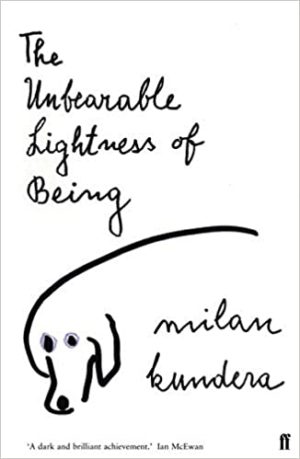The Unbearable Lightness of Being by Milan Kundera is a powerful tour of the emotional realities of late-20th century Czech history. Centered on the story of the young couple Tereza and Tomas, the novel explores the themes of infidelity and meaning-making against the backdrop of the Prague Spring period of 1968. Although intellectual in tone, the novel is entirely readable, thought-provoking, and remains a vibrant lens on history as well.
The story explores the marriage of Tereza, a fragile young woman from a small countryside town, and her husband Tomas, a Prague doctor addicted to sex. When political forces demand that Tomas flee to the countryside and quit his job as a surgeon, he turns to other women as an outlet for his obsession with control of the body. He struggles to accept the seeming meaninglessness of his chance meeting of Tereza as well as the political circumstances unfolding around them.
Meanwhile, Tereza battles with the grief of her husband’s continued infidelity, recalling her childhood with an abusive mother through powerful dreams. Interlaced with their story is that of the elegant but jaded artist Sabina and her lover Franz, an ardent (but married!) Swiss gentleman. Sabina’s brave response to the Communist regime inspires a worshipful naiveté in Franz, who endeavors to face his own demons from within the rarefied world of Geneva. The novel follows the personal growth of these four through a history so marked by unrest and pain that it forces each one to question the very process by which they make meaning out of their lives.
The story is engrossing and intense, one of those books that depicts human life in all of its wild, beautiful, and deeply uncomfortable forms. It also forces you to question how you interpret your own experience, the images you have made into symbols, and even how much you believe in meaning at all—or if you too prefer the “unbearable lightness” itself.
The best example of my own experience of this was my disgust with Tereza’s story, which made me wonder if I was more frustrated with Tomas’s treatment of her or of Kundera’s. (She is, after all, perhaps one of the least empowered female figures in all of literary history!) But dwelling on this question, I had to ask myself how much I believe in artistic license, or if I think every book is simply a theatre for the author’s internalized biases and there’s little that’s transcendent about art-making. But isn’t that my own conditioned viewpoint, as a young liberal woman in the postmodern West? In this way, Kundera expertly illustrates how our images of others (including Kundera himself, in this case!) are colored through the lenses of history, childhood, and even our own personal vice.
The novel thus remains provocative, not so much anymore for its depiction of rampant infidelity but for its more subtle discussion of meaning. Kundera reminds us that the foundations of all philosophy are the emotional experiences of the thinker. In this way he provides a powerful vindication of the assertion made by German Romantic philosopher Johann Gottlieb Fichte: “What sort of philosophy one chooses depends on what sort of man one is.” Balancing philosophy and character study, the book is intellectual and thought-provoking—but like all the best works of literature, it’s also just a great story.
The Unbearable Lightness of Being by Milan Kundera is translated by Michael Henry Heim and published by Faber and Faber.





